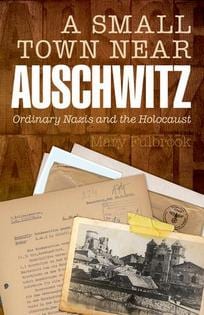Discovering a Nazi in the family: A Small Town near Auschwitz
By Katherine Aitchison, on 26 February 2013
I suspect you’ve never heard of Będzin, a town 25 miles north of the Nazi concentration camp, Auschwitz. I hadn’t. And until she discovered the dark secret of a close family friend, neither had Professor Mary Fulbrook.
Then, one morning, she stumbled upon a shocking fact: Udo Klausa, the man married to her godmother had been the Landrat of Będzin and had sent thousands of Jews to their deaths during World War II.
Thus began years of discovery as Prof Fulbrook attempted to piece together Klausa’s involvement in the atrocities perpetrated by the Nazi party and the truth behind his repeated claims of innocence. A journey that has culminated in the publication of her new book, A Small Town near Auschwitz: Ordinary Nazis and the Holocaust.
On 6 February, Professor Fulbrook (UCL Professor of German History and Vice-Dean of Faculty of Arts and Humanities) joined the Institute of Jewish Studies to discuss the research behind her latest book and the impact the personal story had on her and her historical objectivity.
That the lecture hall was full to capacity, with late comers forced to fetch chairs from a neighbouring room or take a seat on the stairs, is testament both to the poignant subject matter and to the quality of the speaker.
From the first moment, Professor Fulbrook had us all gripped by her voyage of discovery and calm insights into such a disturbing subject matter.
Aside from telling Klausa’s personal story, she also attempted to reason out the ways used by many former members of the Nazi party to reconcile themselves with the horrors they were involved in.
Klausa himself denied all knowledge of the gas chambers of Auschwitz, saying he had no idea what occurred there or at other camps around the country.
He had no knowledge of the suffering endured by the Jews housed at Będzin and was conspicuously absent from the town whenever a particularly significant event took place. His job was purely administrative and he was, therefore, not guilty of anything; he was an innocent bystander.
This veil of ignorance is a common motif among the recollections of men such as Klausa; men who found it hard to live with the guilt of their actions once the war had ended and who sought safety in denial.
However, it is likely that many of these men suffered during the war as well. Professor Fulbrook suggests a theory of “inner unease, outer conformity”: the unconscious suppression of discomfiting knowledge to allow one to perform one’s work.
Klausa was clearly uneasy about the work that he was involved in – he suffered a nervous breakdown in 1942 at the time that Będzin was preparing for the final deportation of Jews to Auschwitz. Professor Fulbrook suggests that he was afraid of “innocently becoming guilty” due to nature of his ‘administrative’ work.
In his memoirs, he writes with empathy for the victims of Nazi policy, but makes it clear that he was never there so there was nothing he could do to help.
Even though he had signed the papers making the ghettoisation of Będzin and the deportation of Jews possible, and there are some significant errors in his chronology, it seems that Klausa not only believed in his own innocence, but was also able to convince his family of his blamelessness.
The talk was a fascinating insight into a relatively unknown region, which played such a major role in the ending of so many lives and into the man who was responsible for so much destruction.
Professor Fulbrook was able to talk of Klausa with an objectivity that must have been hard to achieve given how well she knew the family and used him as an example to give a sense of understanding of the hundreds of people like him across the Third Reich – conflicted men who chose to deny the effect of what they were involved in.
A deeply thought-provoking subject, handled with skill and sensitivity by Professor Fulbrook and an absorbing evening for everyone.
The book, A Small Town near Auschwitz: Ordinary Nazis and the Holocaust, is available now.
 Close
Close

